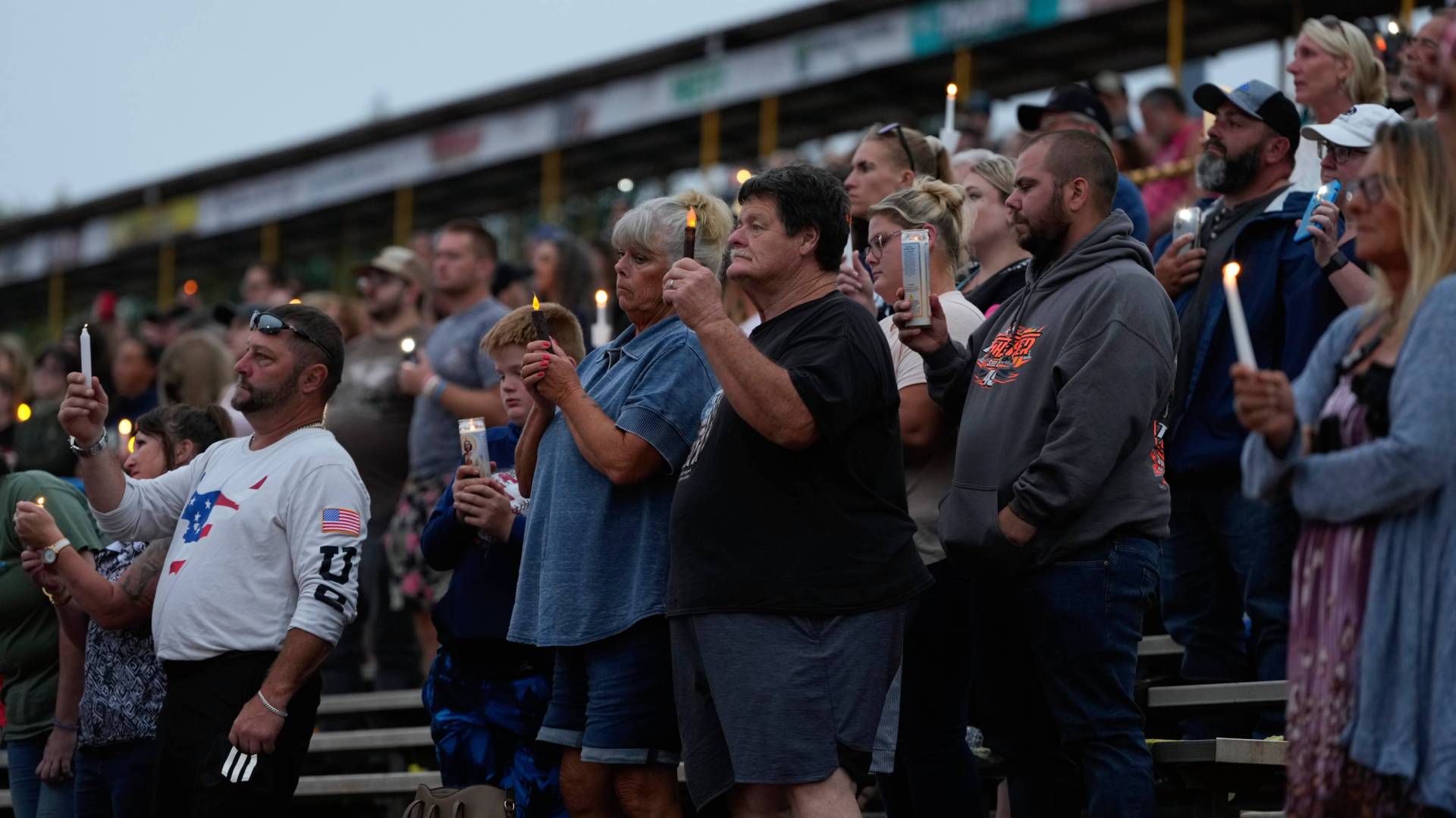The Psalms capture the full range of human experience. Personal and collective, sorrowful and rejoicing, remembering God’s faithfulness and wondering what has become of it—the biblical book, prayed by generations of believers, invites us to enter God’s presence with piercing honesty.
For those of us weaned on the positivity of American evangelicalism, the psalms of lament can take us aback. The authenticity of their angst pushes the boundaries of what we have witnessed in corporate prayer. It calls us to reject toxic positivity and embrace godly grief. And while this wake-up call to embrace the psalms of lament is still badly needed, I suspect we need a similar reckoning when it comes to the psalms of praise.
The claim of the praise psalms is startlingly unique in its context and powerfully relevant in ours, especially in an election year that is charged with political energy. As candidates vie for our votes, Christians hotly debate which contender best reflects our values and which issues most deserve our attention. On top of this, as Jared Stacy noted in a recent article for CT, we are experiencing a rise in politically motivated violence.
While lament is surely appropriate in times like these, maybe the best thing we can do is engage in audacious praise!
I’ve often felt about the praise psalms the way a mom feels about getting a store-bought Mother’s Day card proclaiming in all caps that she is the “BEST MOM EVER.” We know the company has printed thousands of these cards—and I’m the only mom my children have ever had, so how would they know any better?
But when Israel exclaimed, “Praise the LORD!” they were making far more audacious claims than that of a generic greeting card. As Old Testament scholar Walter Brueggemann points out in his excellent book, From Whom No Secrets Are Hid, “an act of praise is not an innocuous ‘spiritual’ act. It is rather a taking of sides for this God against all other gods.” He explains that “hymns of praise are acts of devotion with political and polemical overtones … [and] acts of defiance of the world that is in front of us.”
One reason we often fail to appreciate the power of praise presented in the Psalms is that most English translations render the unique divine name, Yahweh, as LORD (in all caps). Lowercase “Lord” is not a name, but a title indicating a person of status. Most Bible readers miss the distinction. And so, in our attempt to honor God’s name by calling him Lord, we inadvertently erased his divine name, Yahweh. So, the phrase “Praise the Lord” ends up sounding like a Hallmark card—or a Christian version of the “live, laugh, love” creed.
A second reason the impact of the Psalms’ invitation to “Praise Yahweh” is often watered down is that in monotheistic contexts, where many of us grow up being (rightfully) instructed that there is only one God, praising the Lord can seem like stating the obvious. Of course he’s the only one worthy to be praised—because what other creature could compete?
But Israel’s psalms were far grittier than we realize. Every time they sang a psalm, they were making a bold claim that was simultaneously for Yahweh and against other gods.
This is significant, because the Israelites lived in a world crowded with other possible deities to worship. Several thick books on my office shelves catalog these gods alphabetically, explaining what each one was known for. In Egypt, there was Re, the sun god; Isis, the goddess of protection and healing; Hathor, goddess of fertility; Osiris, whose bloodstream was thought to be the Nile; and many dozens more. In Canaan, Baal and Asherah, the god and goddess of fertility, were worshiped, along with El, the supreme God, and a whole pantheon of other options. The gods of Mesopotamia included Marduk, Isis, Ashur, Enlil, Ea, Tiamat, and Adad, to name a few.
More than that, ancient cultures did not worship these deities to express affection but as a matter of necessity. They believed the gods were responsible for the success of their crops and the survival of their children. They believed kings ruled under divine patronage, and that the rulers’ task was to do the bidding of the gods and to maintain order in their realm. Most ancient Near Eastern gods were not absolute but had a particular specialty or a specific jurisdiction.
When we read the praise psalms against that backdrop, a whole new world opens up to us—a world with the potential of reshaping our own. Let’s consider Psalm 96 as an example. I’ve quoted from the NIV here, but replaced “LORD” with the divine name Yahweh to help us experience the power of the original Hebrew in its context:
Sing to Yahweh a new song;
sing to Yahweh, all the earth.
Sing to Yahweh, praise his name;
proclaim his salvation day after day.
Declare his glory among the nations,
his marvelous deeds among all peoples. (vv. 1–3)
Psalm 96 is not generic. It cannot be used in just any worship context, but only to worship Yahweh, the God of Israel. But that’s what makes this psalm so radical: It calls “all the earth” to praise Yahweh, not just the Israelites! All the nations must hear the story of “his salvation.”
Yahweh’s salvation is not something that Israel looked forward to in the future but something they had already experienced when Yahweh defeated Pharaoh at the sea and brought them to safety. The salvation of Yahweh does not offer merely an individual sense of reassurance but the decisive defeat of Egypt and its gods on the world stage (Ex. 12:12; 15:2). Psalm 96 continues:
For great is Yahweh and most worthy of praise;
he is to be feared above all gods.
For all the gods of the nations are idols,
but Yahweh made the heavens.
Splendor and majesty are before him;
strength and glory are in his sanctuary. (vv. 4–6)
The smackdown of this psalm is deliberate and obvious, once you know to look for it. To exalt Yahweh is to demote any other claimants to divine prerogative. Yahweh has all the splendor, while the gods of the nations are nothing more than mute objects. To sing this is to deny the validity of the foundation myths of all of Israel’s neighbors.
Ascribe to Yahweh, all you families of nations,
ascribe to Yahweh glory and strength.
Ascribe to Yahweh the glory due his name;
bring an offering and come into his courts.
Worship Yahweh in the splendor of his holiness;
tremble before him, all the earth.
Say among the nations, “Yahweh reigns.”
The world is firmly established, it cannot be moved;
he will judge the peoples with equity. (vv. 7–10)
What’s remarkable about these verses in Psalm 96 is that they call for the nations to worship at the temple in Jerusalem. It’s not enough for them to admit Yahweh’s power from afar. Their acknowledgment ought to translate into action of the most humbling variety—to make a pilgrimage to a foreign land overseen by another ruler and occupied by another people.
To say that Yahweh reigns not only undermines the authority of every other god in the ancient pantheons of Israel’s neighbors but also calls into question the legitimacy of every human monarch other than the one Yahweh anointed. Since no king ruled except by divine appointment, one of any king’s first priorities was to establish the legitimacy of his rule by showing how the gods had selected him. If those gods were unseated from their heavenly thrones, then the kings who identified with them were also illegitimate. Psalm 96 concludes with these words:
Let the heavens rejoice, let the earth be glad;
let the sea resound, and all that is in it.
Let the fields be jubilant, and everything in them;
let all the trees of the forest sing for joy.
Let all creation rejoice before Yahweh, for he comes,
he comes to judge the earth.
He will judge the world in righteousness
and the peoples in his faithfulness. (v. 11–13)
Israel’s neighbors depicted their gods using the symbols of animals and saw divine representation in trees and oceans—whereas Psalm 96 portrays every created thing as celebrating Yahweh’s rule and standing before him as the ultimate judge. In the end, all will answer to Yahweh. These are fighting words!
Perhaps an illustration will help us appreciate the audacity of praise psalms. The 1965 classic film The Sound of Music offers an analogy. Captain von Trapp is a retired naval officer in Austria raising his seven children with the help of one governess after another. The children are hard on these substitute mothers, so the captain turns to a nearby abbey for help—maybe a nun can keep his children in line! The abbey sends him a novitiate, Fräulein Maria, who wins over the hearts of the children as well as that of their father.
Captain von Trapp and Maria’s romance is set against the backdrop of a growing threat of occupation by Nazi Germany in 1938. They return home from their honeymoon to see a Nazi flag flying over their front door, along with a summons to serve in Hitler’s navy and an (unrelated) invitation for the musical family to perform in the Salzburg Festival. Attempting to escape to neutral Switzerland that very night under the cover of darkness, the family is caught in the act. But thinking quickly, they pretend they are heading to perform in the music festival instead.
That joyous evening of music is strained by the presence of Nazi soldiers guarding the exits. In the front row sits the officer who was sent to escort Captain von Trapp to his new post in Hitler’s navy. While the judges evaluate the results of the competition, Captain von Trapp sings alone in the spotlight, regaling the waiting crowd with a simple song about a white alpine flower native to Austria.
The lyrics are not in themselves seditious, but sung in this context, his audacity is plain. The lilting melody of “Edelweiss” evokes for the crowd a longing for Austrian independence from Nazi Germany. The captain is overcome with emotion and finds himself unable to finish the song. Maria, the children, and the entire audience join him for the final few stanzas, which end with a hopeful prayer: “Bless my homeland forever!”
The Psalms are much like the captain’s song. On their own, they don’t sound rebellious, but set against the backdrop of Assyrian or Persian rule, they represent a form of spiritual insurrection—a kind of active protest to the powers that be. Psalms of praise exalt Yahweh above all human rulers and rival gods, diminishing their right to sovereignty. As we read them today, they call us to reimagine our ultimate citizenship—reminding us that even our elected government officials must one day bow the knee to Yahweh and that all our allegiance belongs only to him.
During this election year in the United States, or wherever we find ourselves, let us re-engage the Bible’s psalms of praise with eyes wide open—recognizing their unyielding summons to bow to our sovereign king.
Carmen Joy Imes is associate professor of Old Testament at Biola University and author of Bearing God’s Name and Being God’s Image. She’s currently writing her next book, Becoming God’s Family: Why the Church Still Matters.




































